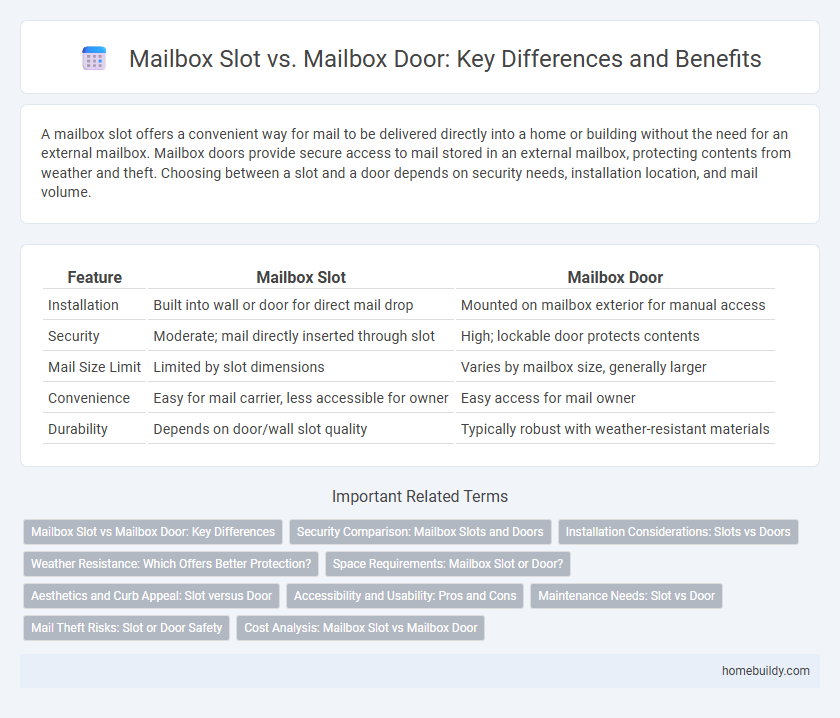A mailbox slot offers a convenient way for mail to be delivered directly into a home or building without the need for an external mailbox. Mailbox doors provide secure access to mail stored in an external mailbox, protecting contents from weather and theft. Choosing between a slot and a door depends on security needs, installation location, and mail volume.
Table of Comparison
| Feature | Mailbox Slot | Mailbox Door |
|---|---|---|
| Installation | Built into wall or door for direct mail drop | Mounted on mailbox exterior for manual access |
| Security | Moderate; mail directly inserted through slot | High; lockable door protects contents |
| Mail Size Limit | Limited by slot dimensions | Varies by mailbox size, generally larger |
| Convenience | Easy for mail carrier, less accessible for owner | Easy access for mail owner |
| Durability | Depends on door/wall slot quality | Typically robust with weather-resistant materials |
Mailbox Slot vs Mailbox Door: Key Differences
Mailbox slots are built into doors or walls, providing a secure and weatherproof method for mail delivery directly into a building. Mailbox doors serve as access points to retrieve mail from external or freestanding mailbox units, emphasizing convenience and accessibility. Key differences include installation location, security features, and user interaction, with slots designed for incoming mail and doors facilitating mail collection.
Security Comparison: Mailbox Slots and Doors
Mailbox slots offer a discreet method for mail delivery, reducing the risk of tampering by limiting access to the interior. Mailbox doors provide sturdier protection with lockable features, preventing unauthorized retrieval and vandalism. Security-wise, mailbox doors typically offer enhanced defense against theft compared to slots, though well-designed slots with minimal gaps can still deter casual intrusions.
Installation Considerations: Slots vs Doors
Mailbox slot installation requires precise wall or door cutouts that ensure weatherproof sealing and secure mail retrieval, often challenging in older constructions. Mailbox doors typically involve mounting on existing boxes or wall units, offering easier maintenance access and enhanced security features like locks but may need reinforcement for weather resistance. Choosing between slots and doors depends on structural compatibility, security needs, and weather exposure in the installation environment.
Weather Resistance: Which Offers Better Protection?
Mailbox slots offer superior weather resistance compared to mailbox doors due to their flush installation within walls, reducing exposure to rain and wind. The slot's narrow opening minimizes water ingress and prevents drafts, whereas mailbox doors often have seams and gaps that require additional sealing to protect contents. Materials like stainless steel or weatherproof composites further enhance the slot's protection against harsh weather conditions.
Space Requirements: Mailbox Slot or Door?
Mailbox slots require minimal space as they are integrated directly into existing doors or walls, making them ideal for locations with limited exterior space. Mailbox doors, on the other hand, need additional clearance for installation and operation, often protruding from the building facade. Choosing between a mailbox slot or door depends on available space, desired accessibility, and architectural constraints.
Aesthetics and Curb Appeal: Slot versus Door
A mailbox slot offers a sleek, minimalist design seamlessly integrated into doors or walls, enhancing curb appeal with a modern touch. In contrast, a mailbox door protrudes outward, becoming a distinct feature that can be styled to complement traditional or decorative home exteriors. Choosing between a slot and a door depends on desired aesthetics, with slots favoring subtlety and doors providing customizable visual statements.
Accessibility and Usability: Pros and Cons
Mailbox slots offer seamless accessibility by allowing mail to be delivered directly inside without needing to open a door, which is ideal for secure, hands-free deposit; however, they can limit the size of items received and may reduce visibility of mail status. Mailbox doors provide greater usability by enabling easy retrieval of bulky or oversized packages and offering better protection against weather and theft, but they require physical access and space for opening, which can be less convenient in tight locations. Choosing between a mailbox slot and a mailbox door depends on factors like mail volume, package size, security preferences, and spatial constraints.
Maintenance Needs: Slot vs Door
Mailbox slot maintenance requires frequent inspection for debris accumulation and weather-related damage to prevent rust and blockages. In contrast, mailbox doors demand regular lubrication of hinges and locks to ensure smooth operation and security. Proper upkeep extends the lifespan of both components, but slots generally need more attention to avoid mail delivery issues caused by obstruction or corrosion.
Mail Theft Risks: Slot or Door Safety
Mailbox slots typically present higher mail theft risks compared to mailbox doors due to their smaller, often unsecured openings that can be easily accessed by thieves. Mailbox doors, especially those with locking mechanisms, provide enhanced security by restricting unauthorized access and protecting contents from theft. Choosing a mailbox door with a robust lock significantly reduces the likelihood of mail theft, ensuring safer delivery and protection of sensitive information.
Cost Analysis: Mailbox Slot vs Mailbox Door
Mailbox slots generally offer lower installation and material costs compared to mailbox doors, making them a budget-friendly option for property owners. Mailbox doors, while typically more expensive upfront, provide enhanced security and weather protection, potentially reducing long-term maintenance expenses. Cost analysis reveals that the choice between mailbox slot and mailbox door depends on balancing initial investment with durability and functionality needs.
Mailbox slot vs Mailbox door Infographic

 homebuildy.com
homebuildy.com